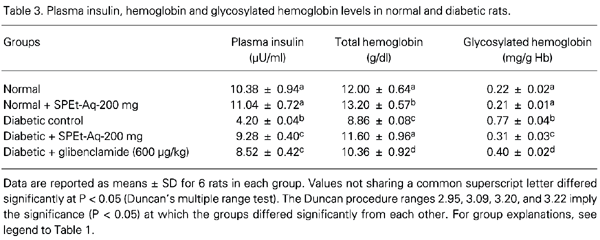The effects of an aqueous extract of the plant Scoparia dulcis (200 mg/kg) on the polyol pathway and lipid peroxidation were examined in the liver of streptozotocin adult diabetic male albino Wistar rats. The diabetic control rats (N = 6) presented a significant increase in blood glucose, sorbitol dehydrogenase, glycosylated hemoglobin and lipid peroxidation markers such as thiobarbituric acid reactive substances (TBARS) and hydroperoxides, and a significant decrease in plasma insulin and antioxidant enzymes such as glutathione peroxidase (GPx), glutathione-S-transferase (GST) and reduced glutathione (GSH) compared to normal rats (N = 6). Scoparia dulcis plant extract (SPEt, 200 mg kg-1 day-1) and glibenclamide (600 µg kg-1 day-1), a reference drug, were administered by gavage for 6 weeks to diabetic rats (N = 6 for each group) and significantly reduced blood glucose, sorbitol dehydrogenase, glycosylated hemoglobin, TBARS, and hydroperoxides, and significantly increased plasma insulin, GPx, GST and GSH activities in liver. The effect of the SPEt was compared with that of glibenclamide. The effect of the extract may have been due to the decreased influx of glucose into the polyol pathway leading to increased activities of antioxidant enzymes and plasma insulin and decreased activity of sorbitol dehydrogenase. These results indicate that the SPEt was effective in attenuating hyperglycemia in rats and their susceptibility to oxygen free radicals.
Glutathione peroxidase; Glutathione-S-transferase; Insulin; Lipid peroxidation; Scoparia dulcis; Sorbitol dehydrogenase; Diabetes




